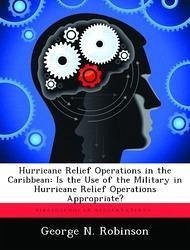Considering meteorological projections, the frequency and magnitude of hurricanes in the Caribbean appear more probable in the future. Correspondingly, this necessitates a more organized response to such threats of devastation. Additional hurricane relief operations increase resource consumption and reduce already scarce resources that are required for competing foreign and domestic policy objectives. This study examines hurricane relief operations to determine if there is an appropriate role for the armed forces of the Caribbean in managing the response to hurricanes. The thesis examines the existing Caribbean agreement that established the Caribbean Disaster Response Agency (CDERA) and compares it to the United States of America Emergency Management Assistance Compact (EMAC). The thesis concludes that there is an appropriate role for the armed forces of the Caribbean in hurricane relief operations and recommends a new policy approach to achieve this objective.
Bitte wählen Sie Ihr Anliegen aus.
Rechnungen
Retourenschein anfordern
Bestellstatus
Storno








